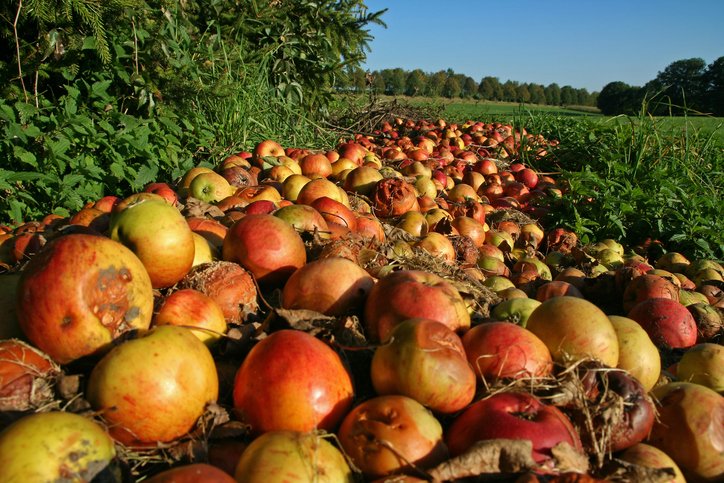Thanks to Defugo’s tech, the nutritious ingredients extracted from organic apples can be added to everything from non-dairy ice cream and bakery products to the meat binders in a burger patty.
‘The apple is the gift that keeps on giving’, David reveals. ‘The fibres are a known balancer of glycemic reaction, an incredible carrier of probiotics for gut health, while the flavonoids found in the skin support brain health. When you start to remove things like sugar from the fibres and add things like flavonoids, we can make them even more functional and use them in next-generation low-sugar, high-fibre baby foods or low-sugar juices that are so loaded with flavonoids that they pop with the bright colours of the fruit they came from.’
Slashing carbon and costs
Defugo has an environment-first approach; all its UPPs are powered by green energy and reuse water extracted from the plants and biomass they process in a world-first zero-waste process.
As each UPP is also able to take waste from other processors, there’s potential to make huge carbon savings.
The Yakima apple UPP is expected to handle a dizzying 30,000,000kg – 30,000 metric tonnes – of ‘waste’ apple per year. With every kg of food waste estimated to create 2.5kg of carbon, the UPP will prevent the release of 75,000,000kg of carbon into the atmosphere.
‘That’s in year one’, David reveals; ‘by year five the UPP’s target carbon reduction figure will be 250,000,000kg per year.’
By removing waste, slashing carbon and improving the nutritional value of a broad range of foods, Defugo’s technology also brings huge benefits to a company’s bottom line. The UN has estimated that for every $1 invested in food waste and loss reduction, companies save $14 in operating costs.
‘By increasing yield, monetising waste, reducing processing costs and removing waste costs, a company can make more money and save more money’, David explains.
Due to the cost-effective nature of the process, the new UPP should also result in healthy, apple enriched foods becoming available to a large section of the American population.
Defugo’s whole-fruit approach will help to bring prices down and shatter the myth that a healthy diet costs more.
Changing the food system
The growing global population is bringing the issue of food waste and healthy diets into sharp focus; as things stand, by 2027 the world will be short of 214 trillion calories.
Every year around a third of the food produced for human consumption – around 1.3 billion tonnes – is never eaten; 30% is lost on the farm, 10% is wasted at the distribution centre and 12% is lost at the supermarket.
David set up Defugo in a bid to help address the global crisis of how to create the nutrition required to feed 9 billion people by 2050. He had previously owned a supply chain technology company, where he saw first-hand the multiple issues in supply chain waste and discovered that many of the ingredients used were far from healthy.
‘Both issues came back to the way we were processing food’, he explains, ‘so I decided to see if there was a better way’.
An extended shelf life
Defugo has invested a lot of time and money in developing not only the technology to extract the food and the energy from the biomass, but also into research around the types of crop that will give the maximum yields when processed.
The company is able to process all fruit and vegetables, but focuses on citrus, apples and pears.
If we don’t process food and turn it into a form that can be stored for a period of time, it will rot – and refrigeration will only ever represent part of the solution.
By separating the biomass into its various parts – water, fibres and sugars – Defugo has created a way to store each separate ingredient in a very focused way, and thus ensure the longest shelf life possible.
‘This allows for the ingredients to be transported, stored or used in times when there isn’t so much food available’, David explains. ‘It’s a very simple concept, but unfortunately not one that’s put into practice that much – hence the global issues we have with food waste.’
Putting a price on waste
As well as presenting a solution to food waste, Defugo’s tech helps growers and farmers to improve profit by using imperfect produce.
Food processors are able to triple current revenues at higher levels of profit by increasing yield and turning waste into high-value functional foods.
Consumer product companies also get an opportunity to create products with higher fibre, lower sugar and more nutrients, which will help them to do their bit to address obesity, diabetes and other chronic diseases.
This is a crucial point at a time when childhood obesity continues to be a national epidemic in the USA, where one in six young people is classed as obese.
All this is the result of tech that significantly reduces the environmental impact of food processing by eliminating waste and the use of chemicals, while reducing water, power and CO2 emissions.
It’s a win for everyone; we can’t wait to see the Yakima UPP in full swing – and perhaps even covered by Oprah.
 Play Video about This Rock Might Just Save The World
Play Video about This Rock Might Just Save The World Play Video about Play 2 hours of rock
Play Video about Play 2 hours of rock Play Video about Play 2 hours of brook
Play Video about Play 2 hours of brook Play Video about Play 2 hours of sheep
Play Video about Play 2 hours of sheep











































